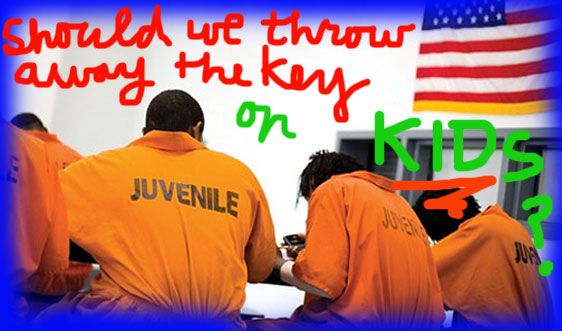
“We can keep the public safe without locking children up forever for crimes committed when they were still considered too young to have the judgment to vote or drive.”
– Elizabeth Calvin, children’s advocate, Human Rights Watch
The Fair Sentencing for Youth Act, SB 399, may or may not be passed into law this week in the California State Assembly. If passed, it would to allow courts to take a second look at cases involving juveniles sentenced to life without parole, (or hugely long sentences that amount to life), after that kid has spent 15-years behind bars. The bill guarantees nothing, but it at least opens up the possibility that an adolescent who did something terrible as a kid, might one day be given the chance to demonstrate his or her worthiness of release.
The bill was amended for what is believed to be the final time this past Friday. It has already passed through California’s Senate.
Interestingly, the best article over the weekend on the state of the bill ran in an Illinois-based publication—the Belleville News Democratic.
(The LA Times ran an op ed urging passage of the bill last week.)
Here are a few representative clips from the Bellville piece:
A 14-year-old south Modesto boy who killed a young father at a child’s birthday party will likely die in prison. Angel Cabanillas, now 19, stands to serve at least 100 years behind bars. But just 40 miles south in Merced, a boy who was 15 when he committed a fatal drive-by to impress his fellow gang members is set to be sentenced Monday to 31 years in prison. He could be out by the time he’s 42.
The disparity in their sentences reflects a divide in how judges and prosecutors handle violent crimes committed by children. The topic of whether minors can be sentenced to die in prison has recently come under scrutiny by the U.S. Supreme Court and the California Legislature, and their discussions could change the rules for cases like Cabanillas.’
In May, the Supreme Court ruled juveniles cannot be sentenced to life in prison without parole for non-homicide crimes. Denying children who commit lesser crimes the opportunity to ever get out of prison constitutes cruel and unusual punishment and runs counter to a worldwide consensus against such harsh sentences for juveniles, the court wrote. But while the decision did not specifically address what can happen to children convicted of murder, legal experts say recent court rulings regarding juvenile justice have shown a trend toward leniency.
[SNIP]
“The court has made clear that juveniles are different than adults,” said Erwin Chemerinsky, dean of the law school at the University of California, Irvine.The California Legislature is heading in that direction, too. On Friday, it moved forward with a bill that would allow courts to take a second look at cases involving juveniles sentenced to life without parole.
It would not prohibit life without parole sentences for juveniles but lets courts review such cases 15 years after sentencing, potentially allowing some young convicts to receive a lesser sentence of 25 years to life.
The existing bill is a watered down version of Yee’s original bill, which would have prohibited life-without-parole sentences for juvenile’s altogether. But the hair of law enforcement groups across the state uniformly burst into flames over the matter of doing away totally with LWOP for kids. Thus a frantic series of amendments were added.
Still SB 399 is a place to start.
That is IF it passes.
The California District Attorney’s Association is still resolutely against it. (We are shocked, shocked.) As is the Republican Caucus. The fear-mongering against the bill has been considerable.
The last round of amendments only passed 34-30—meaning the bill likely has 34 votes locked up. It needs 41 votes to pass.
Let us hope that seven more state assembly persons find their spines and their common sense in time to pass SB 399.
